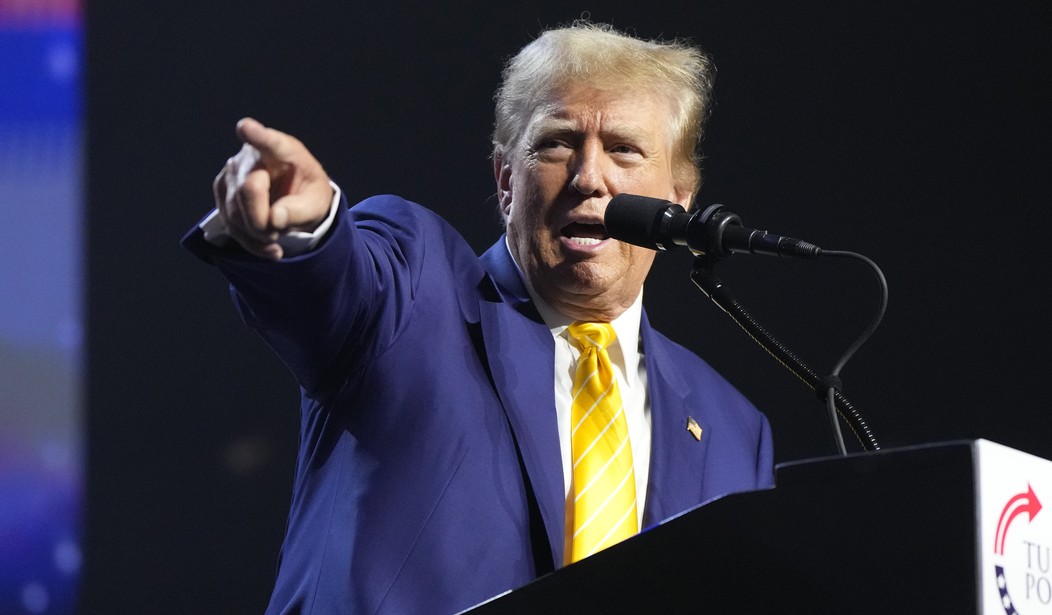When former President Donald Trump agreed to address a conference hosted by an organization that opposes abortion in all circumstances, President Joe Biden's campaign cited the appearance as evidence of Trump's extremism on the issue. But in his brief recorded remarks at the Danbury Institute's Life & Liberty Forum in Indianapolis on Monday, Trump did not explicitly mention abortion at all, although he paid lip service to the value of "innocent life."
That episode reflects the dilemma Trump faces as he tries to retain the support of pro-life activists without alienating voters who reject the hardline position of groups like the Danbury Institute. Trump has staked out a mushy middle ground that is more consistent with public opinion, even as he brags about his role in overturning Roe v. Wade and describes himself as "the most pro-life president in American history."
The Danbury Institute's understanding of "pro-life" is clear. "The greatest atrocity facing our generation today is the practice of abortion -- child sacrifice on the altar of self," it declares. "Abortion must be ended. We will not rest until it is eradicated entirely."
The group emphatically opposes exceptions that Trump supports. "Abortion is never medically necessary to save the life of a mother," it says, adding that "aborting an innocent child conceived in rape or incest only compounds the injustice and pain caused by the initial crime."
Whatever their moral logic, those views are wildly unpopular, even among Republicans. And according to recent polling, voters dissatisfied with current abortion policies overwhelmingly say they are too strict, while 63% of Americans think "abortion should be legal in all or most cases."
The latter view could be consistent with banning abortion after 15 weeks of gestation, since around 96% of abortions are performed before that cutoff. But Trump, after floating the possibility of a 15-week federal ban, reconsidered the idea.
Trump now says abortion regulation should be left to the states, which jibes with the federalist critique of Roe. Biden, by contrast, supports national legislation that would codify Roe's limits, without much regard to the constitutional rationale for overriding state legislators in this area.
Recommended
Roe is often described as recognizing a right to abortion prior to fetal "viability," which nowadays is said to occur around 24 weeks. But Roe and its progeny also required that post-viability abortions be allowed when pregnancies "endanger the woman's life or health" -- a potentially sweeping exception that arguably mandates "abortion access for all pregnancies."
That broad interpretation of the health exception underlies Trump's charge that Democrats are "radically out of touch with the majority of Americans in their support for abortion up until birth," as Trump campaign spokesperson Karoline Leavitt put it. Beyond his rejection of abortion on demand, however, Trump is cagey about which restrictions he favors.
Trump has said "heartbeat" laws, which apply around six weeks into a pregnancy and rule out most abortions, are "a terrible thing and a terrible mistake." But the mistake that Trump perceives seems to be more political than moral.
After Republicans' disappointing performance in the 2022 midterm elections, Trump complained that his party's candidates had "lost large numbers of Voters" because they "poorly handled" the "abortion issue," especially when they "firmly insisted on No Exceptions." Republican politicians who share Trump's concern were relieved when he helped neutralize this electoral liability by accepting a wide range of state policies.
Although Trump's federalist approach has a sound constitutional basis, his apparent agnosticism regarding exactly how abortion should be regulated suggests he has no firm convictions on the subject. Marjorie Dannenfelser, president of Susan B. Anthony Pro-Life America, was "deeply disappointed" by Trump's position, while Live Action founder Lila Rose flatly declared that "President Trump is not a pro-life candidate."
When push comes to shove, Trump is betting, such critics will swallow their reservations and turn out for the man who ensured Roe's demise. But as his triangulation shows, that victory was just the beginning of the struggle to persuade Americans that "abortion must be ended."
Jacob Sullum is a senior editor at Reason magazine. Follow him on Twitter: @jacobsullum. To find out more about Jacob Sullum and read features by other Creators Syndicate writers and cartoonists, visit the Creators Syndicate webpage at www.creators.com.
























Join the conversation as a VIP Member